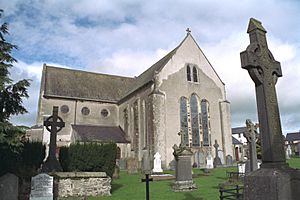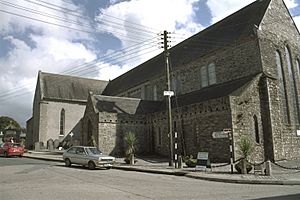Duiske Abbey facts for kids
Quick facts for kids Duiske Abbey |
|
|---|---|
| Graiguenamanagh Abbey | |
|
Mainistir an Dubhuisce
|
|

Choir window as seen from South East
|
|
| 52°32′28.15″N 6°57′16.79″W / 52.5411528°N 6.9546639°W | |
| Location | Abbey Street, Graiguenamanagh, County Kilkenny, Ireland |
| Denomination | Roman Catholic |
| Religious institute | Cistercians |
| History | |
| Status | Active as parochial church |
| Founded | 1204 |
| Founder(s) | William Marshal, 1st Earl of Pembroke |
| Architecture | |
| Style | English Gothic, gothic, romanesque |
| Administration | |
| Diocese | Roman Catholic Diocese of Kildare and Leighlin |
Duiske Abbey, also called Graiguenamanagh Abbey, is a very old church in Graiguenamanagh, County Kilkenny, Ireland. It was built in the 1200s by Cistercian monks. This abbey is one of the biggest and most beautiful old monasteries in Ireland. It was started by William Marshal in 1204. Today, it is the main church for the town of Graiguenamanagh. The abbey gets its name from the nearby Douskey River, which means "Black Water." It sits in the lovely valley of the river Barrow.
Contents
History of Duiske Abbey
How the Abbey Started
Duiske Abbey was founded in 1204. It was started by William Marshal, who was an important earl. Monks from Stanley Abbey in England came to live here. The monks might have arrived in Graiguenamanagh around 1207.
Building work probably began in 1204. That's when the cemetery at Duiske was officially blessed. Before coming to Graiguenamanagh, the monks first settled in a place called Annamult. They built a castle and a round tower there. You can still see the ruins of these buildings today.
Life at the Abbey
By 1228, the abbey was home to many people. There were thirty-six monks and fifty lay-brothers. This made Duiske Abbey almost as large as Mellifont Abbey. The abbot, who was the head monk, even had a seat in parliament. This shows how important the abbey was back then.
Changes Over Time
In 1536, the abbey was closed down by King Henry VIII. The last abbot, Charles O'Cavanagh, gave up his title. Even though it was closed, some monks continued to live there. But the abbey slowly started to fall apart.
After it was closed, the land was given to James Butler of Duiske. The abbey church, however, was still used by local people for worship. In 1744, part of the tower fell down. The Church of Ireland then put a new roof on the west end.
In 1812, the church was given back to the Roman Catholic community. It was fully restored in the 1980s. Today, Duiske Abbey is an active parish church. It also hosts music events, bringing life back to this historic building.
What the Abbey Looks Like
Amazing Architecture
Duiske Abbey was one of the first and largest Cistercian monasteries in Ireland. It is also considered one of the most beautiful. Much of the abbey was built using yellow limestone. This stone was brought all the way from quarries near Bristol, England.
Today, many parts of the monastery still stand. The church has been fully restored. It shows off beautiful "Early English" Gothic and Romanesque styles. You can see original medieval floor tiles inside. These tiles are from the first building.
Special Details
Some of the 13th-century stonework is still visible. You can see carvings of leaves on the stone pillars. There are also "dog-tooth" patterns and striped columns. The abbey has many tall, narrow windows called Lancet windows.
Near the main entrance, there is a stone statue of a 13th-century Norman Knight. This statue was found in the ruins. It shows the knight holding a sword. The details on the statue are amazing. It is one of the best medieval statues in Ireland.
In the northern part of the abbey, there is a model. This model shows what the monastery looked like in the 1300s. There are also signs around the abbey that explain different parts of the building. In the nearby Abbey Centre, you can see modern Christian art and old local items.
See also
 In Spanish: Abadía de Duiske para niños
In Spanish: Abadía de Duiske para niños
- Graiguenamanagh
- Annals of Duiske
- List of abbeys and priories in Ireland (County Kilkenny)
- List of National Monuments in County Kilkenny
 | James Van Der Zee |
 | Alma Thomas |
 | Ellis Wilson |
 | Margaret Taylor-Burroughs |



